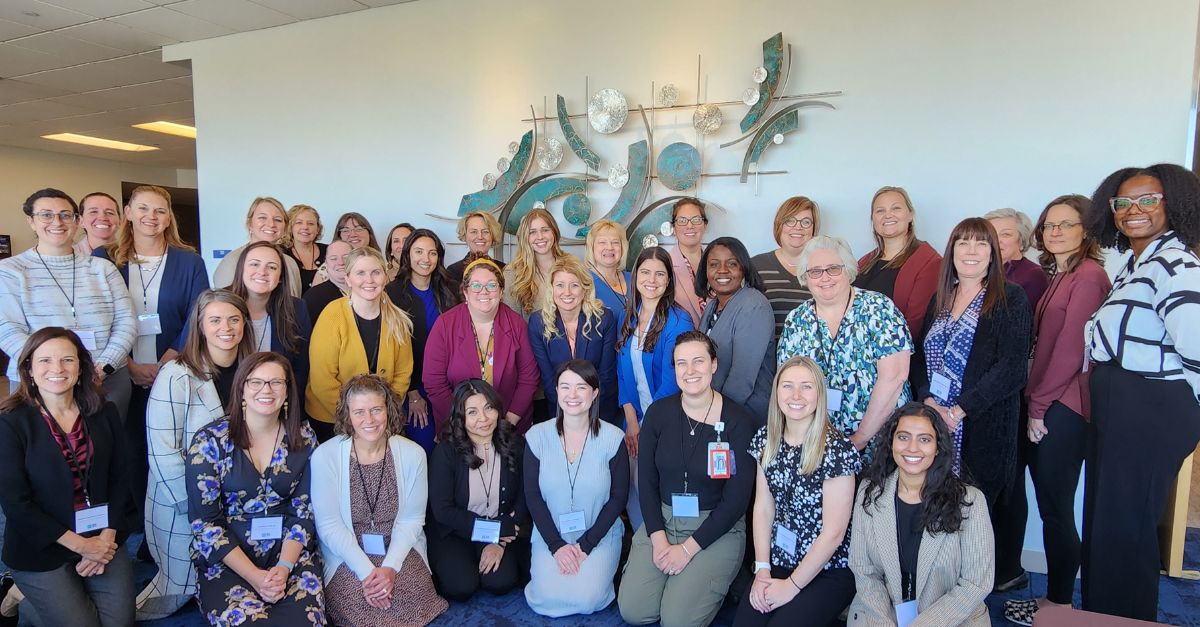As part of the #nursesofPA campaign, the Pennsylvania Action Coalition created 21 short videos featuring nurses from across the state of Pennsylvania. These videos capture the diverse experiences of nurses from all different backgrounds, scopes of practice, geographic locations, ages, and levels of expertise. Nurses share their unique narratives and explore their journeys, challenges, and successes in nursing. In the following videos, nurses share obstacles they overcame in their careers.
Social innovations driven by Pennsylvania nurses were featured in Issue 43 of the Social Innovations Journal. This edition highlighted programs designed to improve health outcomes and the healthcare system in the Commonwealth. Examples include new approaches and collaborative efforts spearheaded by nurses to transform health systems by improving quality, safety, and communication. Innovations in nursing expand beyond technological advancements to new process methods and creative cross-sector partnerships.
The Pennsylvania Action Coalition partnered with the social Innovations Journal, and organized the Social Innovations Journal Symposium at the Free Library of Philadelphia on April 11 to highlight this transformational work.
Read Issue 43 of the Social Innovations Journal

Nurse residency programs assist in preparing nurses to transition from the role of a student nurse to the role of a professional registered nurse into clinical practice. Evidence shows that completing a nurse residency program provides new nurses with the necessary skillset and knowledge to provide safe, high-quality, patient-focused care.
The Pennsylvania Nursing Workforce Coalition (PA-NWC) implements nurse residency programs in response to a key recommendation from the National Academy of Medicine, as outlined in The Future of Nursing: Leading Change, Advancing Health (2011):
"Residency provides a continuing opportunity to apply important knowledge for the purpose of remaining a safe and competent provider in a continuous learning environment."
The Vizient/AACN Nurse Residency Program™ (NRP), developed by Vizient® and the American Association of Colleges of Nursing, supports new graduate nurses through data-driven solutions as they enter clinical practice. The evidence-based curriculum delivers on three key areas: leadership, patient outcomes, and professional development. The NRP helps organizations obtain and maintain Magnet designation by the American Nurses Credentialing Center. The PA-NWC aims to increase the number of health care institutions with the NRP through its strategic partnership with Vizient, Inc.
The PA-NRC was established in 2016 as a partnership of the PA-NWC and Vizient, Inc. to implement residency programs in Pennsylvania and to provide an additional layer of support.
All hospitals and health systems in Pennsylvania that have purchased the Vizient/AACN PA-Nurse Residency Program (NRP) are members of the PA-NRC.
Increase the number of hospitals with nurse residency programs: In November 2016 we formally began our collaboration with Vizient, Inc. and the PA Nurse Residency Collaborative (PA-NRC) was formed. In January 2018 we had 52 hospitals contracted through the PA-NRC. As of September 2023, a total of 76 hospitals are a part of the PA-NRC (75 acute care institutions and 1 rehab hospital). We are always signing new hospitals with the goal of bringing the NRP to every hospital across Pennsylvania.
Advance programs throughout Pennsylvania: The Pennsylvania Nurse Residency Collaborative (PA-NRC) advances residency programs and fosters collaboration among hospitals across PA that participate in the Vizient|AACN Nurse Residency Program. The PA-NRC works to address the diverse needs of hospitals and health systems across PA. The PA-NRC provides a forum for best practices and resource sharing at the state level to ensure the success of each program.
Learn why the PA-NRC was founded, who the PA-NRC is, and how we can help you in bolstering the success of your NRP.
Additionally, if you do not have the NRP at your institution, we invite you to watch this webinar to learn more about the PA-NRC and how we could partner to better support nurses in their transition to practice.
Learn More About PA-NRC
| 2019 | 2020 | 2021 | 2022 | |
| RNs hired at participating PA-NRC hospitals |
3,870 |
3,684 |
4,697 |
4,953 |
| Turnover rate for RNs at participating PA-NRC hospitals | 10% | 16% | 16% | 11% |
| Cost avoidance with the national average turnover rate of 24% and national turnover costs of $88,000 per nurse to PA-NRC turnover rate | $47.7 million | $25.9 million | $33.1 million | $57.1 million |
| Participating Hospitals | |
|
PA-NRC: 79 of 156 acute care hospitals in PA (50%) as of February 2025 |
National Vizient NRP: 661 (June 2022) of 6,129 (May 2023) total hospitals in the U.S. in 2022 (11%) have purchased the NRP |
 The Pennsylvania Action Coalition works actively on initiatives designed to improve consumer experience through better access to high-quality care and fostering interprofessional collaboration to improve quality and safety of care.
The Pennsylvania Action Coalition works actively on initiatives designed to improve consumer experience through better access to high-quality care and fostering interprofessional collaboration to improve quality and safety of care.
Removing the scope-of-practice barriers allows nurses to contribute to a patient-centered, seamless, transformed healthcare system. The Campaign for Action is leading efforts to modernize outdated policies (public and private), change state and federal laws and regulations, and remove cultural and organizational barriers.
Private and public funders, health care organizations, nursing education programs, and nursing associations should expand opportunities for nurses to lead and manage collaborative efforts with physicians and other members of the health care team to conduct research and to redesign and improve practice environments and health systems. These entities should also provide opportunities for nurses to diffuse successful practices. Nurses are at the forefront of redesigning care. Nurses can transform practice to be safer and more responsive to the needs of patients and their families.
 The Pennsylvania Action Coalition (PA-AC) encourages the growth of nurse leaders by providing networking opportunities and education opportunities. The PA-AC also serves as the state liaison to the Nurses on Boards Coalition.
The Pennsylvania Action Coalition (PA-AC) encourages the growth of nurse leaders by providing networking opportunities and education opportunities. The PA-AC also serves as the state liaison to the Nurses on Boards Coalition.
Strong leadership is a critical component of a transformed healthcare system. The nursing profession must produce leaders, who can serve as partners with other health professionals and be accountable for their own contributions to delivering high-quality care.
Nurses need to serve in leadership positions, including on governing boards. Appointing nurses to serve on their boards can help guide management and make improvements. Nurse leaders can provide a valuable perspective that balances the business of healthcare with clinical and patient outcomes. More nurses need to manage health systems and lead health care transformation. They need to position themselves as valued partners in health care improvement.
Nurses on health-related boards can translate their knowledge of bedside care, humanitarian approaches to care and quality & risk management to practice. Collaboration ensures that healthcare is safely delivered to patients and their families, and improves healthcare quality.
Click here to learn more about Pennsylvania Action Coalition's Leadership structure.
Click here to learn about all our initiatives
 A key goal of the Pennsylvania Action Coalition is to advance the educational preparation of the nursing workforce. Nursing education should encourage continued lifelong learning and include opportunities for seamless transitions to higher-degree programs. Increased educational opportunities allow nurses to further develop their skills in providing high-quality care, effectively communicate goals, and contribute to research and programming to advance healthcare safety.
A key goal of the Pennsylvania Action Coalition is to advance the educational preparation of the nursing workforce. Nursing education should encourage continued lifelong learning and include opportunities for seamless transitions to higher-degree programs. Increased educational opportunities allow nurses to further develop their skills in providing high-quality care, effectively communicate goals, and contribute to research and programming to advance healthcare safety.

At the Pennsylvania Nursing Workforce Coalition (PA-NWC), we believe diversity is essential to reducing healthcare disparities and fostering a more inclusive workforce. The Nurse Diversity Council (NDC) is dedicated to advancing diversity and cultural humility in nursing to ensure all Pennsylvanians have access to high-quality, patient-centered care.
The NDC’s mission is to empower nurses with the knowledge, skills, and attitudes needed to provide culturally humble care and promote inclusion throughout the healthcare system. We are committed to creating a workforce that reflects the diversity of the communities we serve, improving healthcare outcomes for all.
The Nurse Diversity Council focuses on:
The Nurse Diversity Council is built on the philosophy of Gracious Space—a spirit of openness and respect. We believe in “inviting the stranger” by welcoming new perspectives and embracing “learning in public,” which means listening with an open mind and being willing to adjust our viewpoints. This framework helps us create an environment where meaningful, inclusive conversations about diversity can thrive.
We invite healthcare professionals and nursing students from all backgrounds across Pennsylvania to join the NDC. As a member, you’ll have the opportunity to collaborate with diverse leaders and professionals in the nursing and healthcare fields. Our members meet once a month via virtual conference to share updates, discuss progress, and drive forward action plans to promote diversity and inclusion in nursing.
To join, please contact PA-NWC Assistant Director, Zaharaa Davood at .
As members of the Nurse Diversity Council, we embrace the spirit of inviting diverse perspectives and learning from each other, fostering an environment of creativity, growth, and mutual respect.
Open to anyone in Pennsylvania who is committed to fostering diversity in healthcare.
Meetings are held virtually once a month, lasting one hour.
We’re always seeking members and guest presenters to highlight meaningful initiatives that promote diversity, equity, and inclusion in healthcare. Presenting at an NDC meeting is a great way to showcase your organization’s impact, share best practices, and connect with like-minded peers. We’d love to hear from you!
Presentation Details:
If you’re interested in presenting or learning more, please contact PA-NWC Assistant Director, Zaharaa Davood at .
Learn About the Strategic Plan in Action The Campaign for Action is a national campaign to transform health and healthcare through nursing. The Campaign for Action envisions a healthcare system where nurses contribute to the full extent of their capabilities. The goals for the Campaign for Action are based on recommendations from the Institute of Medicine’s (now the National Academy of Medicine) Future of Nursing report.
The Campaign for Action is a national campaign to transform health and healthcare through nursing. The Campaign for Action envisions a healthcare system where nurses contribute to the full extent of their capabilities. The goals for the Campaign for Action are based on recommendations from the Institute of Medicine’s (now the National Academy of Medicine) Future of Nursing report.
The campaign is backed by the AARP Foundation, AARP, and the Robert Wood Johnson Foundation. Each state has an action coalition to mobilize nurses, health providers, consumers, educators, and businesses to strengthen nursing on multiple fronts.
The Future of Nursing: Leading Change, Advancing Health report was published by the Institute of Medicine in October 2010. The report was the culmination of two years of research on how to transform the nursing profession. It identifies the nursing professional as a central component to improving the healthcare system, and provides evidence-based recommendations on training, education, professional leadership, and workforce policy. These recommendations aim to create a patient-centered healthcare system that relies on research and the transformative power of nursing to improve health across the country.
The National Academy of Medicine on May 11 released its much-anticipated report, The Future of Nursing 2020-2030: Charting a Path to Achieve Health Equity. Like its predecessor from 2010, this report will influence the direction of nursing and health care for years to come.
The report hones in on the problem of health disparities, rooted in centuries of injustice that will take substantive societal change to solve. Achieving health equity will require serious reflection on our identities and responsibilities as nurses, nurse champions and contributing members of society. Then we will need the willpower to turn that reflection into action.
Read the full report here: The Future of Nursing 2020-2030: Charting a Path to Achieve Health Equity

The Pennsylvania Nursing Workforce Coalition's mission is to advance a nursing workforce that will lead healthcare transformation by cultivating strategic partnerships with diverse populations and organizations.
Partnerships with stakeholders and volunteers allow us to implement initiatives that strengthen the nursing workforce. Your involvement and support allows us to advance nursing to help transform health and health care.